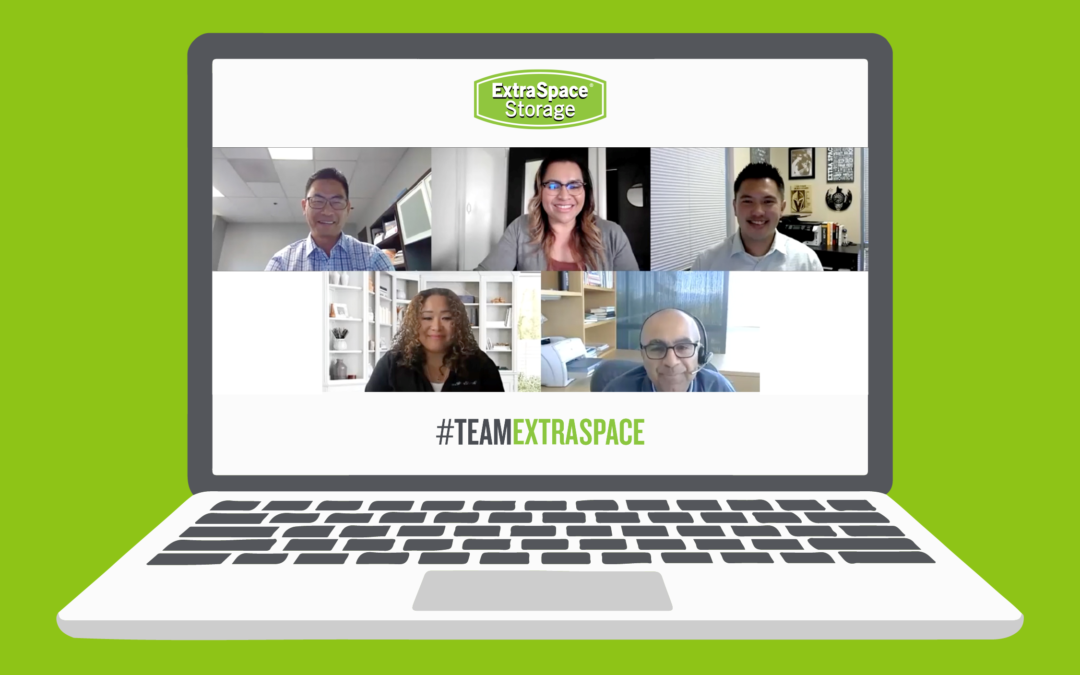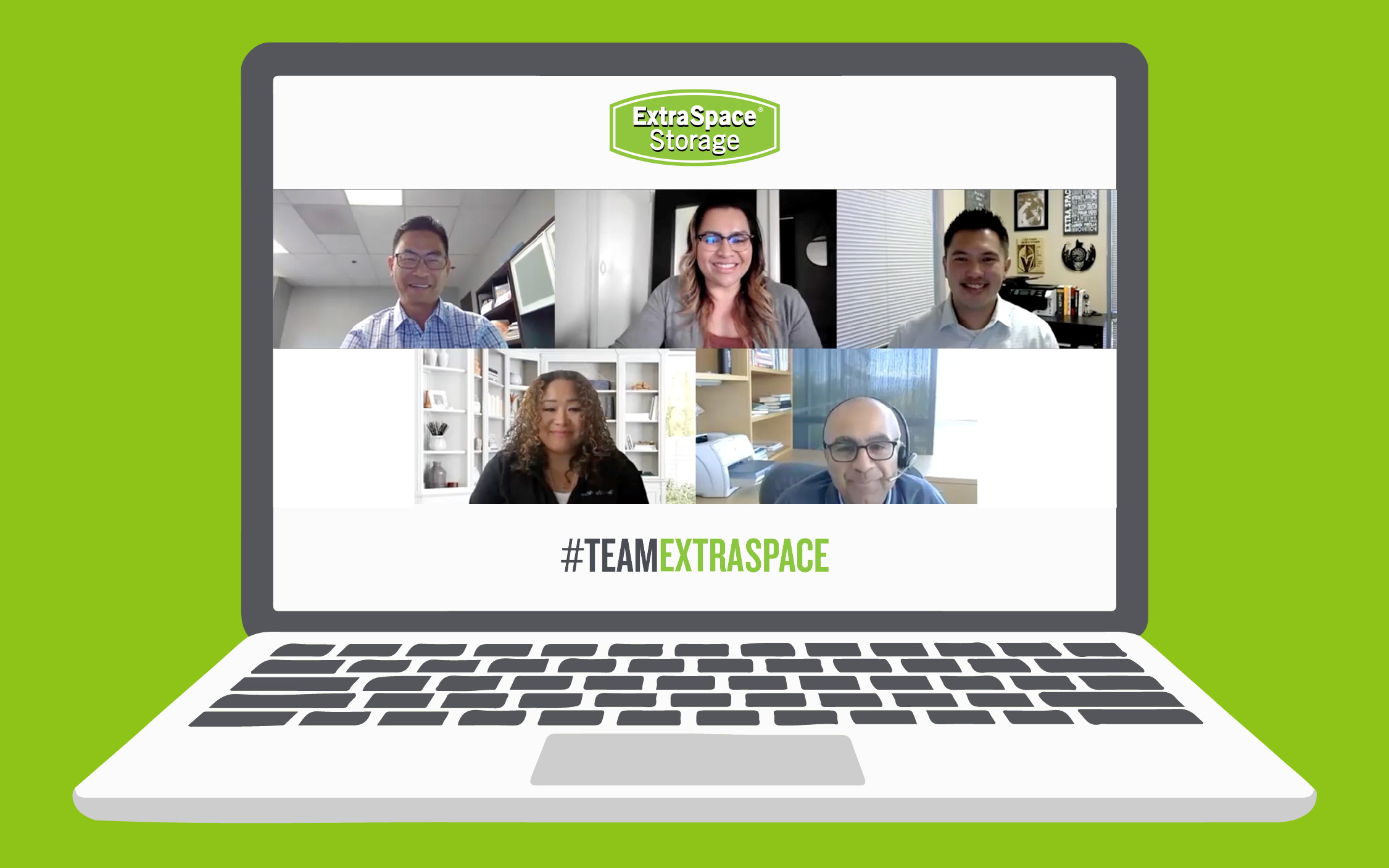For Asian American and Pacific Islander Heritage Month, we’re talking to Extra Space Storage leaders about their careers, what it means to be an ally, and managing discrimination. Samrat Sondhi, Extra Space Storage CMO and Executive Vice President, leads this honest and authentic discussion. Participating in the conversation with Sondhi were:
- Bill Mottram, Senior District Manager
- Tony Chung, District Vice President
- Celes Talauega, National Sales Center Team Lead
- Roz Danford, Safety Manager
Below are video clips and highlights from the discussion.
Q: For AAPI Heritage Month, we wanted to host some of the leaders here at Extra Space Storage and talk about their experience and how they are making Extra Space Storage more inclusive. Let’s start with some quick introductions.
Mottram: I’m Bill Mottram. I’m a Senior District Manager covering Las Vegas, Mesquite, and Idaho. I’ve been with Extra Space Storage since May of 2018—three years this month.
Chung: Greetings, everybody. My name is Tony Chung. I’m born and raised here in Los Angeles. I’ve been with Extra Space Storage for approximately 11 years, and I’m currently a Division Vice President covering Southern California and Arizona.
Talauega: Aloha, everyone. My name is Celes Talauega. I’ve been with Extra Space Storage for seven years. My journey began as a Site Manager in our Utah market. Then, I transitioned to our Salt Lake City Operations Support team, and now I’m currently a Sales Team Lead here at our National Sales Center.
Danford: My name is Roz Danford. I am the Safety Manager here at Extra Space Storage. I’ve been with the company for almost ten years. I started in the field, and about five years ago, I moved to Salt Lake City. I worked at the National Sales Center for a bit, and I’m now back at our headquarters in my current role as Safety Manager.
Sondhi: It’s great to have such diverse backgrounds and have a couple of people on the panel who started at the store level and grown in the organization. That’s great to see. My name is Samrat Sondhi, and I head the Marketing group. I have been with Extra Space Storage since I had a lot more hair about 18 years back.
Q: The theme for AAPI Heritage Month is “Solidarity, Community, and Celebration,” and I’m curious to hear from the panelists on what this means to you?
Talauega: A couple of years ago, when I was working for the Operations Support team, I had the opportunity to come up with Aloha shirts for our Hawaii market. I worked with our uniform vendor to incorporate a design that’s unique to this market and its culture. Three main plant foliage were used—they were Monstera, Ohia Lehua, and the Aalii. The use of these plants in the shirt design served as a symbol and reminder of the Aloha Spirit we give our customers. The spirit of Aloha is love, compassion, and empathy, which is very similar to our company values of Care, Appreciate, and Inform.
Chung:For me, it’s always been a challenge to have a view and perspective of the U.S. versus where my family is originally from. But the best way that I can celebrate heritage is by sharing all the stories and insights that my mother and grandmother, and uncles and aunts, shared with me. I like to share that with other people to give them a peek into my heritage and celebrate where I come from.
Q: We consider allyship to be practicing inclusion and advocating for people. I’m curious to hear about your experiences with allyship and how you’re building an inclusive work environment around you.
Mottram: One thing that’s changed for me has been being open-minded to start conversations that I used to avoid in the past. Whether it’s talking about current events or things happening that affect our country, I used to protect these as things that aren’t workplace topics. But working with my team and having conversations about what’s going on that is affecting them starts with being open and understanding that there are times when people just need to express how they feel. When you’re in leadership, the tendency is to think “I need to fix this” or “You’re bringing this to my attention because you want my input.” I’ve had conversations with some of my peers where the conversation started with “Do you need me to listen today, or do you need my opinion?” I think that’s important to understand.
Talauega: Here at the National Sales Center, my team name is Team Journey. I came up with the name because I wanted everyone to come together. We’re all from different walks of life, and when we come together, we can help support and make an impact on each other. I’m all about making them feel valued, getting to know what makes them tick, and trying to build trust and respect. I want to make them feel valued and engaged while at work.
Q: I’m assuming that all of you have had some sort of discrimination at some point in your careers. Can you share with the group if it’s happened, how you dealt with it, and what we can learn from that experience?
Chung: Unfortunately, I think discrimination is something that’s pervasive, and in light of what’s been going on in the last year or so, it’s as prevalent as ever. I have experienced discrimination probably more times than I can even count. When I was younger, I would handle instances of discrimination with anger, a lot of emotion, retaliation, and quite honestly probably a degree of ignorance, too, because I was trying to fight fire with fire. That’s never a smart thing to do. How I have evolved as a human being today and how I face and handle discrimination is to take the road of forgiveness. It’s hard for me to judge somebody else, and I have no right to do that. There could be an instance where somebody who feels a certain way lacks education or grew up in an environment where that was a pervasive part of their culture. I can’t fault them for that. It’s not right, and I don’t condone that, but it’s never a good thing to offset that with poor behavior yourself. So I take the high road, try to walk away, forgive, and move on.
Talauega: Growing up, I used to get comments about my hair. “Your hair is so big” or “Can you sit in the back because I can’t see the board?” Comments like that. Also, “Can I touch your hair?” People were very curious. It took a long time, but I learned not to take it personally. I was trying to fit in, and it just didn’t work. It finally clicked, and I told myself that I just have to love myself for who I am, and this is who I am.
Danford: I grew up in Fiji, and I finished my university here in America. One of the biggest things I faced when I first entered the workforce—I got pulled aside once by a mentor—who told me you have low numbers, and one of the main reasons is your accent. So I worked with a couple of coaches and took classes to try to reduce my accent. I remember them telling me over and over “You have to have a Midwestern-American accent to make sales.” I worked on it for almost two or three years. After a while, I thought, I can’t keep doing this. I honestly cannot do it! I had to stop and realize I am who I am. This is what makes me unique.
Mottram: Being half-Korean and half-white, the first time I actually discovered that and had a conversation with my mother about it was in middle school. I was in the locker room and one of the other classmates started referencing “You’re Chinese, you’re Chinese.” So I went home and remember talking to my mother about this. Until that point, my parents never discussed any of that. My mother explained to me where she was from, how she met my dad, and what it meant about who I was. That I was unique and had two different backgrounds, and that I should be proud of both equally. That set the stage for me to understand diversity and celebrating differences.
Q: What would be good career advice for all those people listening and hearing this today?
Danford: Work with a mentor or leader that can help you develop a plan. When I was in the field, I was stuck on wanting to be a District Manager. Then, I realized that Extra Space Storage had a lot more opportunities out there. Be open and flexible. Be true to yourself and who you are, and your personality will shine. I think that’s what is going to set you apart from everybody else.
Chung: The recipe that’s worked for me throughout my professional career is to be critical and objective of yourself. Know what you are good at and what you need to learn to have an opportunity to get to the next level of your career. The second piece of advice that I would give is to continue to reinvent yourself. You have to learn new skills and be hungry for new information and knowledge. There’s a saying: “What got you here won’t get you there.” I firmly believe that.
Talauega: For me, it’s a piece of advice from my Chinese grandmother: “Stay humble, and let your work speak for itself.” I’ve always made that a life goal to stay humble, put my head down, and work hard. In addition to that, be open to feedback. Never be satisfied with who you are today. Just as our company innovates and improves, we should also do that for ourselves.
Mottram: I’m a big believer in the power of manifestation. Professional archers believe that the arrow doesn’t seek the target, but that the target draws the arrow. If you have things you want to do in your career, shout it out to the universe. The laws of attraction and magnetism will help guide you and move you towards that target. The second thing I would add is, I think the most critical thing to do along that journey is to share your gifts with others. Share your learning experiences and growth. The return on investment when you share your time with others by far exceeds anything else that you will accomplish as an individual.
Extra Space Storage is committed to fostering a diverse and inclusive workplace with its Diversity & Inclusion committees and internal initiatives like the recent “Ask—Listen—Act” campaign. Learn more about our values and company culture.

